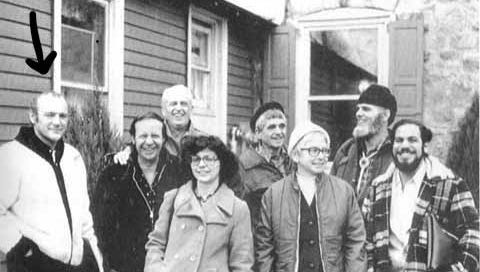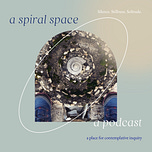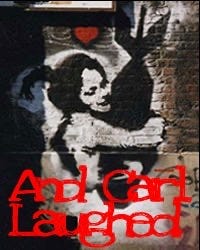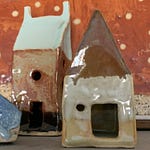There are two pieces here - the podcast above and a short reflection below. They work together. You can read or listen in any order, but I do hope you do both.
I don’t know about you, but so many of my “feelings” around injustice, selfishly, stem from my inability to effect real change.
This week’s Prayer Practice (podcast above) is about community - or as I’m calling it “Common Unity.” It is a call to witness, to not look away from the violence, the injustice, the suffering of war. There are no easy answers to what is “the best” thing to do in light of such things. We’re all called to act in different ways, but collectively we can commit to staying present and aware so that when an opportunity to contribute arises, we are ready and more than willing to take a step towards helpful action.
If we fail to see a way towards action in the moment, however, we can remember that acting justly is a transitive property. We may not be able to house a Ukrainian family, but we can volunteer at a homeless shelter in our community. “Truly I tell you, whatever you did for one of the least of these brothers and sisters of mine, you did for me.” (Matthew 25:40)
Like many of the absurdist plays teach us, war doesn’t make sense and our responses to their absurdity can be equally convoluted.
Father Carl Kabat, the Clown Priest
Fifteen years ago my friend Nick and I wrote a play with a group of our students about a local priest, Fr. Carl Kabat. Carl is an Oblate priest who was part of the Plowshares 8, a group of Christian pacifists that protested nuclear armament led by the brothers and priests Daniel and Philip Berrigan. The group would break into nuclear missile plants, bang on vehicles, pour blood on documents and whatever other non-violent mayhem they could do as an act of civil disobedience.
When we wrote the play, Carl was back in prison for an action he had recently taken. Carl’s protests had developed since the Berrigan years. One year when Good Friday had coincided with April Fool’s day, Carl dressed as a clown and broke into a nuclear missile silo to pour blood from an oversized clown baby bottle. This became his signature act. Our play was a clown play. We toured it to churches and street performances and eventually to the Fringe Festival in Edinburgh, Scotland. A week before we left for Scotland, Carl got out of prison and was able to see the play. We performed it for him and his family privately. In the audience, he wore a red nose and cried through the performance. At the end, he rushed the stage to give each student a huge bear hug.
One of the biggest questions we had to ask ourselves as we wrote the play was, “Why this?” To us, this didn’t seem like an act of protest that did much to bring about change. It didn’t really DO anything. But what we realized over the year that we researched, wrote and workshopped the play, was that Carl had spent time in both the Philippines and in Recife, Brazil. The poor of both of these nations suffered unduly while their governments spent money on buying (mostly American) weapons. Carl saw a direct correlation to children starving and the military industrial complex.
When he was sent home to Illinois for reasons of safety, the only thing he could see as a way to stand in solidarity with his Filipino and Brazilian brothers and sisters was to protest the most egregious weapons in the American arsenal - nuclear bombs.
Of course, now in the wake of the war in Ukraine, our fear over Russia's nuclear arsenal is newly piqued. And in light of living through two years of unprecedented times, the jump in our imaginations to nuclear war isn’t as outlandish as it was fifteen years ago.
I’ve been talking a lot about Carl lately. I opened and reread the play just last week for the first time in years. I’ve been in contact with students from that production in recent weeks as well. And then, just this past week, I woke up to an email from Fr. Carl’s niece. She was looking for me to tell me that Carl is in hospice and that they are looking for mementos from the play to include as they plan his services.
Carl’s spirit is a powerful one. I can’t help but think that it has been moving beyond the confines of his bedridden body and inciting all of us who have been touched by his story to remember, to bear witness to never forget.
I have a feeling I’m going to be writing about Carl more in the coming months, but for now I want to lift him up as a man who was steadfast and dogged in his determination to stand up for the call on his life, however crazy it seemed to the rest of us.
















Share this post